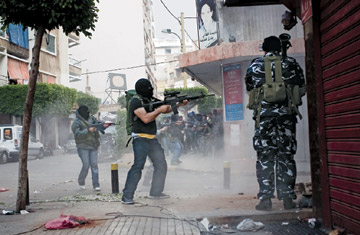
SHOOT-OUT IN WEST BEIRUT: Shi'ite gunmen from Hizballah and its ally Amal fire at Sunni positions. Their superior numbers and firepower helped the Shi'ite militias secure a quick victory
(2 of 2)
That train has left the station. The speed and ease with which Nasrallah's fighters took over Beirut — and the military's reluctance to stop them — suggest that Hizballah has free rein of the country. Unlike Hamas, which is confined to poverty-stricken Gaza, Hizballah has at its disposal an entire country, complete with a sophisticated banking system, an international airport and a friendly neighbor in Syria. Never has a terrorist organization had that kind of infrastructure. Saab notes that Hizballah's leaders can now have their cake and eat it too: "They're in control in Lebanon without having to actually run the state."
This is all very bad news for Israel, which was drawn into a war with Hizb-allah in 2006 that cost 1,600 lives, mainly on the Lebanese side. "Lebanon," says Israeli Vice Premier Haim Ramon, "is controlled by this terrorist organization, and its government has become irrelevant." Israelis point out that behind Nasrallah and his fighters lurks a possibly greater threat: Iran. Hizballah's dominance in Beirut allows Tehran to project its power into the Mediterranean Sea, something the U.S. and its European allies must now factor into their calculations. (The Pentagon denied reports that the U.S.S. Cole, heading to the Mediterranean from the Persian Gulf, was responding to the Lebanon crisis.)
The Bush Administration's response has consisted largely of hand-wringing. President George W. Bush blamed Iran for backing Hizballah, while Secretary of State Condoleezza Rice congratulated the Arab League for issuing a statement rejecting the use of violence in Lebanon. In truth, not for the first time in the Middle East, the Administration finds itself short of good options. It can no longer count on Siniora and the Lebanese security forces to halt Hizballah's growing strength. The only way to achieve that, says Saab, is to press Israel to give up disputed territory it seized in 1967. "It removes the pretext Hizballah has for its weapons," he says.
But Israel has given no indication it will make any such concession, and few in Lebanon expect Nasrallah and his militia to weaken anytime soon. That's why some U.S. allies in Siniora's government believe it's better to engage Hizballah than pretend it can be crushed. On May 11, Walid Jumblatt, one of the leaders of the governing coalition, placed a call to Nabih Berri, the speaker of Parliament and a Hizballah ally, while TIME waited nearby for an interview. "Tell [Nasrallah] I lost the battle and he wins," Jumblatt said. "So let's sit and talk to reach a compromise. All that I ask is your protection."
As the hereditary chieftain of Lebanon's Druze Muslim minority, Jumblatt earned the nickname "the Weather Vane" for being able to steer his followers through the ever changing winds of Middle Eastern politics. A former vassal to the Syrian regime, he switched his loyalties to the Bush Administration after the invasion of Iraq, when it briefly seemed as if American military power would transform the region. Now he seems ready to turn again. Sitting in his garden terrace with a few family members and loyal retainers, Jumblatt said that he has spoken with the U.S. embassy to deliver his grim assessment. "The U.S. has failed in Lebanon," he said. "We have to wait and see the new rules which Hizballah, Syria and Iran will set. They can do what they want."
Brian Bennett/Washington and Tim McGirk/Jerusalem
Understanding Hizballah
Goal
An umbrella organization of radical Shi'ite groups, it is dedicated to the destruction of Israel. Bitterly opposes the U.S. and other Western nations
Origins
Founded in 1982 in response to the Israeli invasion of Lebanon, it has close links with Iran and Syria
Operations
In addition to employing several thousand militants, it provides social services — schools, hospitals and agricultural aid — for poor Shi'ites
Attacks
It is blamed for several terrorist strikes on U.S. and Israeli targets — including the 1983 bombing of a Marines barracks in Beirut, in which 241 died